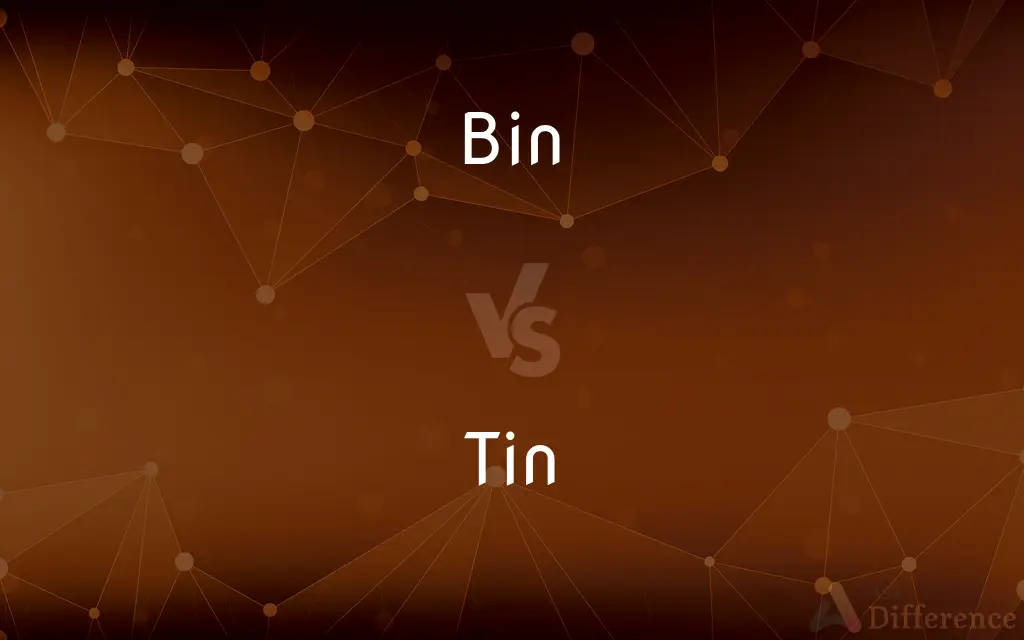Bin vs. Tin — What's the Difference?
By Tayyaba Rehman & Maham Liaqat — Updated on May 6, 2024
Bin refers to a container used for storage or waste disposal, while tin is a metal element used in making various products.

Difference Between Bin and Tin
Table of Contents
ADVERTISEMENT
Key Differences
A bin is commonly used to store items or dispose of waste, providing organizational solutions in households and businesses. Whereas, tin is a metal known for its corrosion resistance and is used in making cans, foils, and other metallic items.
Bins are usually made from materials like plastic, metal, or wood, tailored to their specific use such as holding trash or storing goods. On the other hand, tin is a chemical element with the symbol Sn and atomic number 50, primarily used in alloys and protective coatings.
In everyday usage, bins are essential for waste management, helping in sorting and recycling. Conversely, tin is vital in the production of bronze and solder, playing a crucial role in various industrial applications.
Bins vary in size and design depending on their purpose, from small desktop bins for paper waste to large commercial dumpsters. Whereas tin is often found combined with other metals and is used to create materials with enhanced properties, like pewter.
The recycling of bins depends on the material they are made from, with plastic and metal bins being commonly recycled. Tin, on the other hand, is recycled at a high rate globally due to its value and widespread use in packaging and electronics.
ADVERTISEMENT
Comparison Chart
Definition
A container for storage or waste disposal.
A metallic element used in manufacturing and coating.
Common Uses
Waste disposal, storage.
Soldering, plating, manufacturing cans.
Material Type
Plastic, metal, wood.
Metal (element).
Durability
Varies with material.
High corrosion resistance.
Recycling
Often recyclable.
Highly recyclable.
Compare with Definitions
Bin
An area in software for discarded files.
I found the lost document in the computer's recycle bin.
Tin
A chemical element with symbol Sn.
Tin is used extensively in soldering applications.
Bin
A container used to store items.
She placed the toys back into the storage bin.
Tin
To cover with a thin layer of tin.
Tin plating is essential for making metals more resistant to corrosion.
Bin
A large container for industrial storage.
The warehouse has several large bins for storing grains.
Tin
A colloquial term for a can.
She opened a tin of beans for dinner.
Bin
A receptacle for waste.
He threw the wrapper into the trash bin.
Tin
A container made from tinplate.
He packed his lunch in a small tin.
Bin
A category or grouping based on type or class.
In data analysis, we sort the data into different bins.
Tin
Metal used for plating to prevent corrosion.
The steel was coated with tin to protect it from rusting.
Bin
(statistics) Any of the discrete intervals in a histogram, etc
Tin
Tin is a chemical element with the symbol Sn (from Latin: stannum) and atomic number 50. Tin is a silvery metal that characteristically has a faint yellow hue.
Bin
A container or enclosed space for storage.
Tin
Symbol Sn A crystalline, silvery metallic element obtained chiefly from cassiterite, and having two notable allotropic forms. Malleable white tin is the useful allotrope, but at temperatures below 13.2°C it slowly converts to the brittle gray allotrope. Tin is used to coat other metals to prevent corrosion and is a part of numerous alloys, such as soft solder, pewter, type metal, and bronze. Atomic number 50; atomic weight 118.71; melting point 231.93°C; boiling point 2,602°C; specific gravity (gray) 5.77, (white) 7.29; valence 2, 4. See Periodic Table.
Bin
To place or store in a bin.
Tin
Tin plate.
Bin
A box, frame, crib, or enclosed place, used as a storage container.
A corn bin
A wine bin
A coal bin
Tin
A container or box made of tin plate.
Bin
A container for rubbish or waste.
A rubbish bin
A wastepaper bin
An ashes bin
Tin
A container for preserved foodstuffs; a can.
Bin
Any of the fixed-size chunks into which airspace is divided for the purposes of radar.
Tin
The contents of such a container.
Bin
Jail or prison.
Tin
To plate or coat with tin.
Bin
(in Arabic names) son of; equivalent to Hebrew tr=ben.
Tin
Chiefly British To preserve or pack in tins; can.
Bin
(computing) binary
Tin
Of, relating to, or made of tin.
Bin
To dispose of (something) by putting it into a bin, or as if putting it into a bin.
Tin
Constructed of inferior material.
Bin
To throw away, reject, give up.
Tin
Spurious.
Bin
(statistics) To convert continuous data into discrete groups.
Tin
(uncountable) A malleable, ductile, metallic element, resistant to corrosion, with atomic number 50 and symbol Sn.
Bin
(transitive) To place into a bin for storage.
To bin wine
Tin
An airtight container, made of tin or another metal, used to preserve food, or hold a liquid or some other product.
A tin of baked beans; a tobacco tin; a tin of shoe polish
Empty tins, cans, and plastic containers are recycled in the blue bins.
Bin
Alternative form of been
Tin
(countable) A metal pan used for baking, roasting, etc.
Muffin tin
Roasting tin
Baking tin
Bin
A box, frame, crib, or inclosed place, used as a receptacle for any commodity; as, a corn bin; a wine bin; a coal bin.
Tin
The bottom part of the front wall, which is "out" if a player strikes it with the ball.
Bin
To put into a bin; as, to bin wine.
Tin
Money, especially silver money.
Bin
An old form of Be and Been.
Tin
Computer hardware.
Bin
A container; usually has a lid
Tin
Made of tin.
Bin
The quantity contained in a bin
Tin
Made of galvanised iron or built of corrugated iron.
Bin
An identification number consisting of a two-part code assigned to banks and savings associations; the first part shows the location and the second identifies the bank itself
Tin
(transitive) To place into a metal can (ie. a tin; be it tin, steel, aluminum) in order to preserve.
Bin
Store in bins
Tin
(transitive) To cover with tin.
Tin
(transitive) To coat with solder
Tin
To coat with solder, in preparation for soldering, to ensure a good solder joint
Tin
To coat with solder, in order to consolidate braided wire, so as to make contact with all strands and reduce fragility of the fraying wire
Tin
An elementary substance found as an oxide in the mineral cassiterite, and reduced as a soft silvery-white crystalline metal, with a tinge of yellowish-blue, and a high luster. It is malleable at ordinary temperatures, but brittle when heated. It is softer than gold and can be beaten out into very thin strips called tinfoil. It is ductile at 2120, when it can be drawn out into wire which is not very tenacious; it melts at 4420, and at a higher temperature burns with a brilliant white light. Air and moisture act on tin very slightly. The peculiar properties of tin, especially its malleability, its brilliancy and the slowness with which it rusts make it very serviceable. With other metals it forms valuable alloys, as bronze, gun metal, bell metal, pewter and solder. It is not easily oxidized in the air, and is used chiefly to coat iron to protect it from rusting, in the form of tin foil with mercury to form the reflective surface of mirrors, and in solder, bronze, speculum metal, and other alloys. Its compounds are designated as stannous, or stannic. Symbol Sn (Stannum). Atomic weight 117.4.
Tin
Thin plates of iron covered with tin; tin plate.
Tin
Money.
Tin
To cover with tin or tinned iron, or to overlay with tin foil.
Tin
A silvery malleable metallic element that resists corrosion; used in many alloys and to coat other metals to prevent corrosion; obtained chiefly from cassiterite where it occurs as tin oxide
Tin
Metal container for storing dry foods such as tea or flour
Tin
Airtight sealed metal container for food or drink or paint etc.
Tin
Plate with tin
Tin
Preserve in a can or tin;
Tinned foods are not very tasty
Tin
Prepare (a metal) for soldering or brazing by applying a thin layer of solder to the surface
Common Curiosities
Can bins be recycled?
Yes, bins made of materials like plastic and metal can often be recycled.
What is a bin typically used for?
Bins are used for storing goods or disposing of waste.
What types of bins are there?
There are several types, including recycling bins, waste bins, and storage bins.
Are all bins designed for outdoor use?
Not all bins are suitable for outdoor use; some are designed for indoor use like office bins.
How are tin cans made?
Tin cans are made by coating steel or iron with tin in a thin layer to prevent rusting.
What are the properties of tin?
Tin is corrosion-resistant, malleable, and has a low melting point.
How is tin used in electronics?
Tin is primarily used in soldering to join electronic components.
What is tin pest?
Tin pest is a phenomenon where tin deteriorates at low temperatures.
What alloys use tin?
Tin is used in alloys like bronze and pewter.
What is the most common use of tin today?
The most common use is in the manufacturing of tinplate for cans and other containers.
How does the durability of bins vary?
Durability varies based on the materials used, such as plastic, metal, or wood.
Why is tin important in metal plating?
Tin plating helps protect base metals from corrosion and oxidation.
How are bins sized?
Bins are sized according to their intended use, from small desk bins to large commercial dumpsters.
Share Your Discovery

Previous Comparison
Dusky vs. Wheatish
Next Comparison
Passion vs. ZealAuthor Spotlight
Written by
Tayyaba RehmanTayyaba Rehman is a distinguished writer, currently serving as a primary contributor to askdifference.com. As a researcher in semantics and etymology, Tayyaba's passion for the complexity of languages and their distinctions has found a perfect home on the platform. Tayyaba delves into the intricacies of language, distinguishing between commonly confused words and phrases, thereby providing clarity for readers worldwide.
Co-written by
Maham Liaqat















































